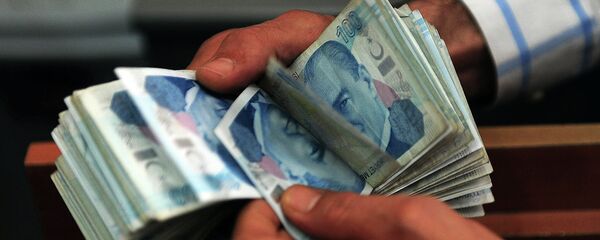Analysts predict that in 2016 the budget deficit will widen to 4.5 percent of GDP.
"Even if this coup fails, it is a disaster for Turkey where the risk premium on the political side must move up sharply," Emad Mostaque, a London-based strategist at emerging-markets consultancy Ecstrat, was cited by Bloomberg.
"This could also act as a catalyst for the next leg down in emerging markets as it sullies the entire asset class. We maintain that political risk is being underpriced by markets," he added.
Amid the recent attempted coup the Turkish lira has already dropped by 4.6 percent, to 3.0157/$1, a record low in the last eight years.
On Saturday, President Recep Tayyip Erdogan announced that the coup was foiled and the government had restored control over the country.
Over 260 people were killed and hundreds were injured during the events, while some 6,000 people have already been detained.
"Though quashed within hours, the failed takeover threatens to destabilize an economy that depends heavily on capital inflows to finance its current-account deficit. Erdogan’s increasingly authoritarian streak was already worrying investors as he pushed his top economic advisers one-by-one from office, stoking fears of policy mistakes and leading to a drop in foreign investment," Bloomberg analysts wrote.
On Friday, the Organization for Economic Cooperation and Development called on the Turkish government to enact reform in order to avoid deepening economic crisis.
The OECD expected a 3.9 percent growth of Turkey’s GDP in 2016 and 3.7 percent in 2017. In 2015, the Turkish economy expanded by four percent.
At the same time, the Turkish government is trying to calm investors.
On Saturday, Deputy Prime Minister Mehmet Simsek said the government controls the situation and there is no macroeconomic threat in Turkey.
"Our country is returning quickly to normal after this putsch attempt rebuffed by our nation," Simsek wrote in Twitter.
"Our country’s macroeconomic fundamentals remain solid. We are taking all the necessary measures," he added.
The main current threats to the Turkish economy are slowing exports and weak investment. The country is also suffering from a downward trend in tourism revenues.
"It is a very serious confidence shock but it also depends on how permanent the depreciation in the currency will prove," Murat Ucer, economist at Global Source Partners, a consultancy, told The Financial Times.




